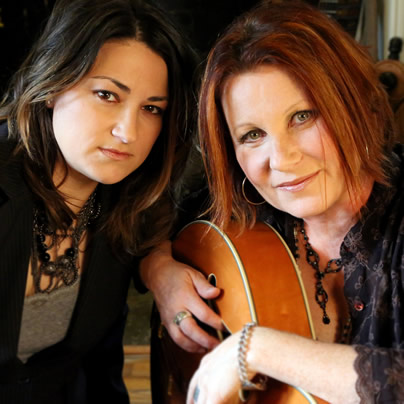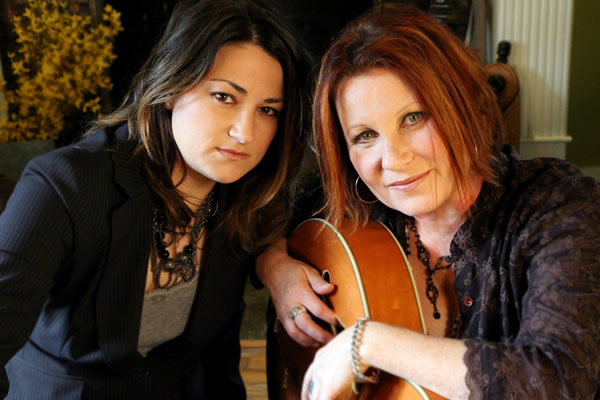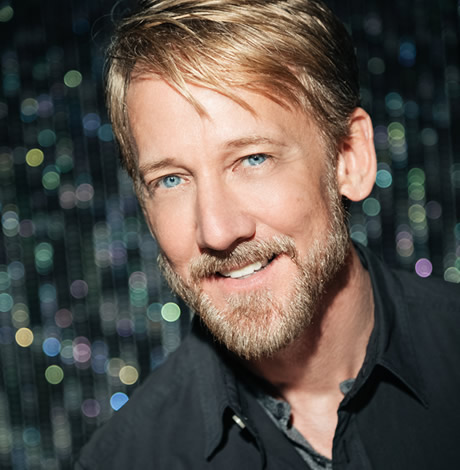Arts & Entertainment
Sisters in spirit
Gospel music vets Knapp, Becker unite for Christmas album, tour

Margaret Becker and Jennifer Knapp
‘The Hymns of Christmas Tour’
Monday, 7:30 p.m.
The Birchmere
3701 Mount Vernon Ave.
Alexandria, VA
$25

Margaret Becker (right) a veteran of gospel music with classic albums like ‘Immigrant’s Daughter’ and ‘Simple House’ in her canon, just finished a Christmas album with Jennifer Knapp, a gospel artist who emerged in the late ’90s. (Photo by Heidi Groff; courtesy Jay Jones Music)
Any touring musician will tell you life on the road — even when you can afford first class all the way — can get to you after years of going through the endless recording/promoting/touring/repeat cycle.
Two gospel music veterans who, at different times and to varying degrees, each spent years out of the limelight, are back with a wildly unexpected joint project — an album called “The Hymns of Christmas.” On it, Margaret Becker and Jennifer Knapp trade leads and harmonies and enjoy what they say is great musical repartee. They’re half-way through a 14-date mini-tour to support it and play the Birchmere in Alexandria, Va., Monday night.
Knapp, 38, released her first major label album to the Christian market in 1998 and worked solidly touring and recording through 2002 at which time she went on a long hiatus, moved to Australia and pretty much gave up any thoughts of continuing her career. She came out as a lesbian in April 2010 and released a comeback album called “Letting Go.” She maintains her Christian faith but says, though she doesn’t claim to be a theologian, she believes many of the scriptures traditionally used to condemn gays have been misunderstood and misinterpreted.
Becker, 53, was practically peerless among Christian music women rockers in her heyday. She released her first album in 1987 and though she recorded plenty of ballads and exhibited tremendous songwriting prowess, Becker always rocked harder than her contemporaries like Amy Grant or Twila Paris. Becker enjoyed a great run throughout the late ‘80s and ‘90s but slowed down tremendously by the ‘00s. Her new effort with Knapp is her first new album since 2007’s “Air.”
During a lunch break last week between back-to-back shows in Canton, Ohio and Indianapolis, Knapp fields a bevy of questions on how she has settled into being an openly gay singer, the collaboration with Becker and how it came about and what fans can expect from their show next week at the Birchmere.
It’s a highly non-glam tour and Knapp makes no attempt to hide it. They’re sharing a van and Becker is in line getting lunch at a Subway while Knapp answers Blade questions. Though the interview is with Knapp, Becker quickly follows up with e-mail inquiries later in the day.
“It’s just gonna be Margaret and I with a couple of acoustic guitars, but don’t let that fool you,” Knapp says. “It’s one of the most fun times I’ve ever had and it’s not gonna be some pared down girly acoustic thing. It’s gonna be a really good, full-voiced night. It shocks me when I look over at her and see how much she gives each night.”
Though not as active as she formerly was, Becker still speaks at religious women’s events and participates in hymn recording projects. Her audience is very much part of the Nashville-based contemporary Christian industry, the ranks of which both she and Knapp came through.
The two met in about 2000 when they both participated in a pair of multiple-artist projects and became friends. Knapp, who long has admired Becker, says it took no arm-twisting to convince Becker to record and tour with her, though many gospel fans turned their back on Knapp.
“Fortunately it’s not really an issue we’ve had,” Knapp says. “Tonight’s going to be a prime example. We’re playing at a United Methodist church in Indianapolis. It will be a lovely Christmas evening and the last thing we’ll be talking about is our sexual orientation. It’s a huge step for that church to host somebody like me and just proceed as if it’s business as usual but I think we’re seeing that more and more in terms of the public consciousness. I think we saw that in this last election. It’s great that people can take that and not draw this unusual amount of attention to it. That’s really the extraordinary part of it.”
Becker, in an e-mail exchange, says she’s not finding fans and those coming to the shows to be inferring anything about her life or ministry by her collaboration with Knapp.
“The audiences who are supporting this are music lovers who recognize when the work is symbiotic and complementary,” Becker says. “We’ve played this tour to those people, groups that I consider to be overlapping supporters from both of our bases. They are respectful and come for the music and spirit or the art of the material. I don’t think they give it much more thought than that and to me, that’s perfect. That’s how it should be.”
For the record, Becker declines to comment on her own sexual orientation. “My personal life is private and I’m very happy,” she wrote in an e-mail via her publicist. “I am very supportive of Jennifer and this musical partnership we’ve created and look forward to sharing it with her supporters and mine.”
The album features mostly acoustic arrangements of traditional church classes like “Hark the Herald Angels Sing,” “The First Noel,” “What Child is This,” “Silent Night” and more. Neither artist had recorded a Christmas album before and now that both are again living in the Nashville area, they decided this summer to go ahead and make it happen.
“We finally said, ‘Let’s just do it, let’s just get it done,’” Knapp says. “There was no pressure to write anything new, they’re all hymns so there’s a great wealth of material there and lots of opportunities for us to harmonize. We just decided to put our money where our mouth was and go ahead and do it.”
Becker concurs.
“One night we just got serious and realized we’d both put off making a Christmas record over the course of our careers, at least the kind that was indigenous to us. That’s where the idea came from. Making music with a dear friend who is also an awesome talent was the catalyst for me. It was fun top to bottom.”
The indie album was recorded on a shoestring with, Knapp says, basically “one mic and one computer.” She says the advance of user-friendly recording software made it possible to do the album without spending thousands. They did some spring rehearsing, hit the studio in July (when most Christmas albums are recorded) and did most of the work in a four-week span. The mixing and packaging came soon after and the project wrapped in October.
“It did feel a little weird at first singing all these Christmas songs while you’re just dripping in sweat in the middle of the hot Tennessee summer,” she says. “So at the beginning, yeah, it took a little time to wrap my head around a Christmas project but pretty quickly it really did start to feel like its own project. It didn’t feel kitschy or Christmasy really to me. We approached it in a very honest sense and didn’t want to make it kitschy. Maybe it’s just because I was involved with it but I really was thinking, ‘Wow, I could listen to this any time of the year.’”
The first half of the show is basically the new album. In the second half, the two revisit their hits, trade harmonies on each other’s songs and keep it loose enough that the set list varies from show to show.
“We’ve sort of got this telepathy thing going on for the last two or three shows,” Knapp says. “We’ll just kind of riff on a theme for a bit and it’s great knowing you don’t have to play it exactly the same way every night or carry the full weight of the evening by yourself.”
Knapp ends the conversation weighing in on a blaze of topics. On whether or not Christians in the U.S. are becoming less rigid on homosexuality, Knapp says there “will always be people who aren’t going to change their minds no matter what.” She says she finds encouragement in the Mainline Protestant denominations that are making gay-friendly strides more and more as time progresses.
Why then, one wonders, have those kinds of churches not spawned their own cottage industry of gospel music the way the evangelical/Bible Belt world did starting with “Jesus music” in the late ‘60s?
“It’s a question I’ve been asking myself for years,” Knapp says. “There are thousands of singers who write about their faith from very different viewpoints but I really think a lot of it has to do with the circumstances in that world where the people who run the industry really see themselves as the gatekeepers and a great emphasis is placed on how the individual artist acts and who they hang out with and how you think about your faith. We’ve seen a lot of strong artists pulled from shelves because they’ve gotten divorced or had an alcohol problem or whatever. As a songwriter you really have to keep writing true and honest stories. If you’re only writing music for Christians, by Christians to make more Christians, you kind of lose out.”
Lee Tucker, a long-time gay gospel music fan and Alexandria, Va., resident, says Knapp deserves enormous credit for being brave enough to come out, despite what it might cost her in lost airplay, space at Christian retail and fans.
“I think it’s amazing she took the brave jump to come out,” Tucker says. “It was a big jump for Chely Wright too because a lot of country music is in the Midwest and in the Bible Belt, but it’s even more of a leap for Jennifer because it will totally change her market. If you went into a Christian bookstore right now, you wouldn’t find any of her stuff on the shelves at all.”
For LGBT teens who might be coming up in evangelical households, Knapp says hang in there and remember there are faith-based Christian groups out there that affirm gays.
“Absolutely get online, there are so many people out there waiting with open arms,” she says. “The Christian Network, Believe Out Loud, Soulforce, Inside Out Faith — there are a lot of people out there offering very compassionate, faith-based support. It’s not longer just churches being the bad guys here. A lot of them are starting to get the message.”
Books
Love or fear flying you’ll devour ‘Why Fly’
New book chronicles a lifetime obsession with aircraft

‘Why Fly’
By Caroline Paul
c. 2026, Bloomsbury
$27.99/256 pages
Tray table folded up.
Check. Your seat is in the upright position, the airflow above your head is just the way you like it, and you’re ready to go. The flight crew is making final preparations. The lights are off and the plane is backing up. All you need now is “Why Fly” by Caroline Paul, and buckle up.

When she was very young, Paul was “obsessed” with tales of adventure, devouring accounts written by men of their derring-do. The only female adventure-seeker she knew about then was Amelia Earhart; later, she learned of other adventuresome women, including aviatrix Bessie Coleman, and Paul was transfixed.
Time passed; Paul grew up to create a life of adventure all her own.
Then, the year her marriage started to fracture, she switched her obsession from general exploits to flight.
Specifically, Paul loves experimental aircraft, some of which, like her “trike,” can be made from a kit at home. Others, like Woodstock, her beloved yellow gyrocopter, are major purchases that operate under different FAA rules. All flying has rules, she says, even if it seems like it should be as freewheeling as the birds it mimics.
She loves the pre-flight checklist, which is pure anticipation as well as a series of safety measures; if only a relationship had the same ritual. Paul loves her hangar, as a place of comfort and for flight in all senses of the word. She enjoys thinking about historic tales of flying, going back before the Wright Brothers, and including a man who went aloft on a lawn chair via helium-filled weather balloons.
The mere idea that she can fly any time is like a gift to Paul.
She knows a lot of people are terrified of flying, but it’s near totally safe: generally, there’s a one in almost 14 million chance of perishing in a commercial airline disaster – although, to Paul’s embarrassment and her dismay, it’s possible that both the smallest planes and the grandest loves might crash.
If you’re a fan of flying, you know what to do here. If you fear it, pry your fingernails off the armrests, take a deep breath, and head to the shelves. “Why Fly” might help you change your mind.
It’s not just that author Caroline Paul enjoys being airborne, and she tells you. It’s not that she’s honest in her explanations of being in love and being aloft. It’s the meditative aura you’ll get as you’re reading this book that makes it so appealing, despite the sometimes technical information that may flummox you between the Zen-ness. It’s not overwhelming; it mixes well with the history Paul includes, biographies, the science, heartbreak, and exciting tales of adventure and risk, but it’s there. Readers and romantics who love the outdoors, can’t resist a good mountain, and crave activity won’t mind it, though, not at all.
If you own a plane – or want to – you’ll want this book, too. It’s a great waiting-at-the-airport tale, or a tuck-in-your-suitcase-for-later read. Find “Why Fly” and you’ll see that it’s an upright kind of book.
The Blade may receive commissions from qualifying purchases made via this post.
Theater
Out actor Kevin Cahoon on starring role in ‘Chez Joey’
Arena production adapted from Broadway classic ‘Pal Joey’

‘Chez Joey’
Through March 15
Arena Stage
1101 Sixth St., S.W.
Tickets start at $93
Arenastage.org
As Melvin Snyder in the new musical “Chez Joey,” out actor Kevin Cahoon plays a showbiz society columnist who goes by the name Mrs. Knickerbocker. He functions as a sort of liaison between café society and Chicago’s Black jazz scene circa 1940s. It’s a fun part replete with varied insights, music, and dance.
“Chez Joey” is adapted from the Broadway classic “Pal Joey” by Richard Rodgers and Lorenz Hart. It’s inspired by John O’Hara’s stories based on the exploits of a small-time nightclub singer published in The New Yorker.
A warm and humorous man, Cahoon loves his work. At just six, he began his career as a rodeo clown in Houston. He won the Star Search teen division at 13 singing songs like “Some People” from “Gypsy.” He studied theater at New York University and soon after graduating set to work playing sidekicks and comedic roles.
Over the years, Cahoon has played numerous queer parts in stage productions including “Hedwig and the Angry Inch,” “La Cage aux Folles,” “Rocky Horror” as well as Peanut in “Shucked,” and George the keyboardist in “The Wedding Singer,” “a sort of unicorn of its time,” says Cahoon.
Co-directed by Tony Goldwyn and the great Savion Glover, “Chez Joey” is a terrific and fun show filled with loads of talent. Its relevant new book is by Richard Lagravenese.
On a recent Monday off from work, Cahoon shared some thoughts on past and current happenings.
WASHINGTON BLADE: Is there a through line from Kevin, the six-year-old rodeo clown, to who we see now at Arena Stage?
KEVIN CAHOON: Anytime I want to land a joke in a theater piece it goes back to that rodeo clown. It doesn’t matter if it’s Arena’s intimate Kreeger Theatre or the big rodeo at the huge Houston Astrodome.
I was in the middle stadium and there was an announcer — a scene partner really. And we were doing a back and forth in hopes of getting laughs. At that young age I was trying to understand what it takes to get laughs. It’s all about timing. Every line.
BLADE: Originally, your part in “Chez Joey” Melvin was Melba who sings “Zip,” a clever woman reporter’s song. It was sort of a star feature, where they could just pop in a star in the run of “Pal Joey.”
CAHOON: That’s right. And in former versions it was played by Martha Plimpton and before her Elaine Stritch. For “Chez Joey,” we switched gender and storyline.
We attempted to do “Zip” up until two days before we had an audience at Arena. Unexpectedly they cut “Zip” and replaced it with a fun number called “I Like to Recognize the Tune,” a song more connected to the story.
BLADE: Wow. You must be a quick study.
CAHOON: Well, we’re working with a great band.
BLADE: You’ve played a lot of queer parts. Any thoughts on queer representation?
CAHOON: Oh yes, definitely. And I’ve been very lucky that I’ve had the chance to portray these characters and introduce them to the rest of the world. I feel honored.
After originating Edna, the hyena on Broadway in “The Lion King,” I left that to do “Hedwig and the Angry Inch” as standby for John Cameron Mitchell, doing one show a week for him.
Everyone thought I was crazy to leave the biggest musical of our time with a personal contract and getting paid more money that I’d ever made to get $400 a week at the downtown Jane Street Theatre in a dicey neighborhood.
At the time, I really felt like I was with cool kids. I guess I was. And I never regretted it.
BLADE: When you play new parts, do you create new backstories for the role?
CAHOON: Every single time! For Melvin, I suggested a line about chorus boys on Lakeshore Drive.
BLADE: What’s up next for Kevin Cahoon?
CAHOON: I’m about to do the New York Theatre Workshop Gala; I’ve been doing it for nine years in a row. It’s a huge job. I’ll also be producing the “Cats: The Jellicle Ball” opening on Broadway this spring; it’s a queer-centric uptown vogue ball with gay actor André de Shields reprising his role as “Old Deuteronomy.”
BLADE: There’s a huge amount of talent onstage in “Chez Joey.”
CAHOON: There is. I’m sharing a dressing room with Myles Frost who plays Joey. He won accolades for playing Michael Jackson on Broadway. We’ve become great friends. He’s a miracle to watch on stage. And Awa [Sal Secka], a D.C. local, is great. Every night the audience falls head over heels for her. When this show goes to New York, Awa will, no doubt, be a giant star.
BLADE: Do you think “Chez Joey” might be Broadway bound?
CAHOON: I have a good feeling it is. I’ve done shows out of town that have high hopes and pedigree, but don’t necessarily make it. “Chez Joey” is a small production, it’s funny, and audiences seem to love it.

The Capital Pride Alliance held the annual Pride Reveal event at The Schuyler at The Hamilton Hotel on Thursday, Feb. 26. The theme for this year’s Capital Pride was announced: “Exist. Resist. Have the audacity!”
(Washington Blade photos by Michael Key)























-

 India5 days ago
India5 days agoActivists push for better counting of transgender Indians in 2026 Census
-

 Advice5 days ago
Advice5 days agoDry January has isolated me from my friends
-

 National5 days ago
National5 days agoAfter layoffs at Advocate, parent company acquires ‘Them’ from Conde Nast
-

 District of Columbia5 days ago
District of Columbia5 days agoCapital Pride reveals 2026 theme


















